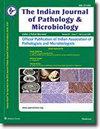大肠癌中C-X-C趋化因子受体4型(CXCR4)和过氧化物酶体增殖物激活受体γ(PPAR-γ)表达的评估:与可用临床病理参数的关系。
IF 0.5
4区 医学
Q4 PATHOLOGY
引用次数: 0
摘要
背景:结直肠癌(CRC)是胃肠道最常见的恶性肿瘤,是一个令人难以置信的健康问题。开发针对CRC肿瘤发生和发展的新靶点的药物,以改善疾病的管理是至关重要的。本研究的目的是评估C-X-C趋化因子受体4型(CXCR4)和过氧化物酶体增殖物激活受体γ(PPAR-γ)在CRC中的表达,并将其表达与可用的临床病理参数联系起来。材料和方法:本研究包括50例原发性CRC。所有病例均用CXCR4和PPAR-γ抗体染色,以评估其免疫组织化学表达。评估其表达与临床病理变量之间的关系。结果:在76%的研究病例中检测到CXCR4的表达。CXCR4的高表达与肿瘤侵袭深度(P=0.024)、淋巴结转移(P=0.009)、肿瘤晚期(P=0.001)和血管侵袭的存在(P=0.035)显著相关。在78%的研究病例中检测到PPAR-γ的表达。PPAR-γ的表达与组织学类型(P=0.001)、肿瘤分级(P=0.005)、肿瘤侵袭深度(P=0.001,以及大肠癌的血管侵袭。本文章由计算机程序翻译,如有差异,请以英文原文为准。
Evaluation of C-X-C chemokine receptor type 4 (CXCR4) and Peroxisome proliferator-activated receptor gamma (PPAR-γ) expression in colorectal carcinoma: Relation to the available clinicopathological parameters.
Background: Colorectal carcinoma (CRC) is the most common malignancy of the gastrointestinal tract, representing an incredible health problem. It is essential to develop drugs against novel targets––involved in CRC tumorigenesis and progression––to improve the management of the disease. The aim of this study was to evaluate C-X-C chemokine receptor type 4 (CXCR4) and Peroxisome proliferator-activated receptor gamma (PPAR-γ) expression in CRC, and to associate their expression with the available clinicopathological parameters. Materials and Methods: This study included 50 cases of primary CRC. All cases were stained by CXCR4 and PPAR-γ antibodies to assess their immunohistochemical expression. The relations between their expression and clinicopathological variables were assessed. Results: CXCR4 expression was detected in 76% of studied cases. High CXCR4 expression showed significant associations with the depth of tumor invasion (P = 0.024), lymph node metastasis (P = 0.009), advanced tumor stage (P = 0.001) and the presence of vascular invasion (P = 0.035). PPAR-γ expression was detected in 78% of studied cases. PPAR-γ expression showed a statistically significant inverse relation with histologic types (P = 0.001), tumor grade (P = 0.005), depth of tumor invasion (P = 0.001), lymph node status (P = 0.001), TNM stage (P = 0.002), and vascular invasion (P = 0.001). Conclusions: High CXCR4 and decreased PPAR-γ expressions are related to high tumor grade, advanced stage, and vascular invasion in colorectal carcinoma.
求助全文
通过发布文献求助,成功后即可免费获取论文全文。
去求助
来源期刊

Indian Journal of Pathology and Microbiology
PATHOLOGY-
CiteScore
1.20
自引率
0.00%
发文量
422
审稿时长
1 months
期刊介绍:
The journal will cover studies related to pathology including morbid anatomy, surgical pathology, clinical pathology, diagnostic cytopathology including gynecologic cytology and aspiration cytology, hematology including immuno-hematology and medical microbiology. The journal gives preference to clinically oriented studies over experimental and animal studies. The Journal would publish peer-reviewed original research papers, case reports, systematic reviews, meta-analysis, letters to the editor and brief communications. Review articles on current topics usually are invited by the editor.
 求助内容:
求助内容: 应助结果提醒方式:
应助结果提醒方式:


